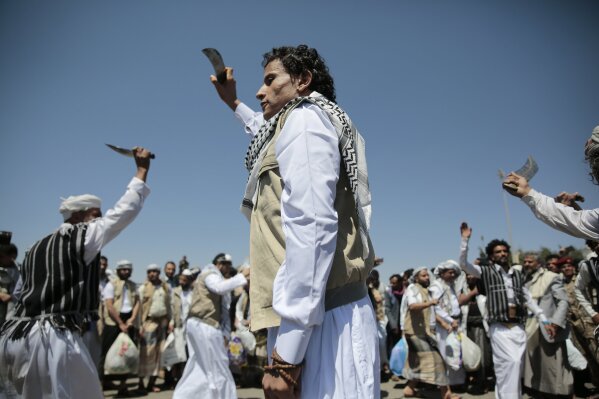Yemen’s rival sides complete war’s largest prisoner exchange
SANAA, Yemen (AP) — Yemen’s warring sides completed a major, U.N.-brokered prisoner swap on Friday, officials said, a development that could revive the country’s stalled peace process after more than five years of grinding conflict.
This week’s prisoner release, the largest-ever in the war, marks a breakthrough in the implementation of a long-awaited deal between Yemen’s Iran-backed Houthi rebels and a Saudi-led military coalition supporting the country’s internationally recognized government. International pressure has been building on the parties to end the war, which has killed thousands of civilians and triggered the world’s worst humanitarian crisis.
“We’re very happy this operation has concluded with success, regardless of how challenging it was to put it together,” said Yara Khawaja, a spokeswoman for the International Committee of the Red Cross in Yemen, which has overseen the swap. She expressed hope it would help the warring sides overcome mistrust and restart more substantive negotiations “to end the suffering of millions of Yemenis.”
U.N. Secretary-General Antonio Guterres called the release “an important step” and “proof that important breakthroughs can be achieved through dialogue and compromise,” U.N. spokesman Stephane Dujarric said.
The U.N. chief urged the parties “to continue on this path” and finalize a joint declaration including a nationwide ceasefire, economic and humanitarian measures, and resumed U.N.-mediated political negotiations to end the war -- an appeal echoed by the U.N. Security Council.
The council welcomed commitments by both sides to negotiate further prisoner exchanges, stressed the need for a de-escalation of fighting, and “expressed deep concern that famine is a realistic prospect in Yemen this year if food imports or distribution are disrupted and economic collapse continues, “exacerbated by the outbreak of Covid-19 and locust infestations.”
On Friday, several planes ferrying a total of 352 freed prisoners from both sides landed in Sanaa, Yemen’s rebel-held capital, and the southern port city of Aden, the seat of the internationally recognized government, according to the Red Cross. An unprecedented 1056 freed detainees returned home in the two-day swap, including hundreds released on Thursday.
Abdul Raqib al-Omari, director of Aden’s airport, confirmed to The Associated Press that two planes touched down in the city a few hours apart, bringing the total number of prisoners returned to the Yemeni government on Friday to 152.
The first of those who arrived in Aden on Friday had been captured in fierce battles along Yemen’s western coastline, in the strategic port city of Hodeidah, according to officials in the city’s prisoner reception committee. The officials spoke on condition of anonymity because they weren’t authorized to talk to the media. The day’s second transfer involved an undisclosed number of civilians who had been arrested at checkpoints or kidnapped from homes of relatives in the rebel-held capital during the war, they added.
Among those freed and flown to Aden on Friday was Eid Allah al-Kouli, a prominent Yemeni intellectual and author who was captured by the Houthis in Hodeidah before being imprisoned in the capital for five years, according to Ahmed Naji, a leader of Yemen’s writers’ union. Naji described al-Kouli as a prisoner of conscience, targeted for his criticism of Houthi authorities.
The devastating conflict erupted in 2014, when the Houthis seized the capital, Sanaa, and much of the country’s north. That prompted a U.S.-backed Arab military coalition to intervene months later in a bid to restore the government of Yemeni President Abed Rabu Mansour Hadi to power.
In Sanaa, the Houthi-run al-Masirah TV showed the newly freed rebels, clad in traditional white robes, stepping off the plane onto a long red carpet, where they were greeted by crowds of officials, aid workers and relatives as trumpets blared and cries of “God is great!” rang out. They prostrated themselves on the floor, kissing the carpet.
Ahmed Hamed, a Houthi leader, promised cash bonuses to all freed prisoners and said authorities would help all unmarried men cover their wedding expenses.
“We will not abandon our prisoners or forget them,” said Abdel Qader Mortada, the head of the Houthi Committee for Prisoners Affairs, in a message congratulating the freed captives. He said the Houthis were seeking to sign another U.N.-mediated agreement to free more detainees.
In a speech to the U.N. Security Council on Thursday, U.N. special envoy for Yemen Martin Griffiths described the exchange as “an airlift of hope.” He called for civilians and those arbitrarily detained during the war also to be released, including journalists.
The initial prisoner exchange deal, involving thousands of detainees, was considered a breakthrough during 2018 peace talks in Sweden aimed at ending a war that has killed 112,000 people and pushed millions to the brink of famine. But ongoing military offensives and deep-seated mistrust between the warring sides have repeatedly caused agreements to crumble.
___
DeBre reported from Dubai, United Arab Emirates.







